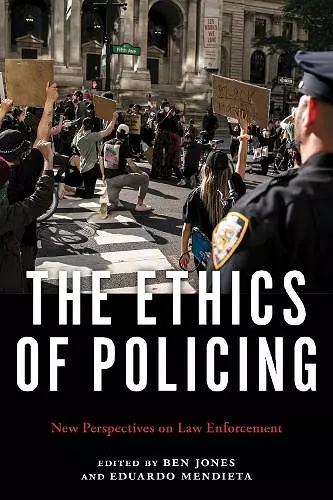The Ethics of Policing
New Perspectives on Law Enforcement
Ben Jones editor Eduardo Mendieta editor
Format:Paperback
Publisher:New York University Press
Published:20th Jul '21
Currently unavailable, and unfortunately no date known when it will be back

Top scholars provide a critical analysis of the current ethical challenges facing police officers, police departments, and the criminal justice system
From George Floyd to Breonna Taylor, the brutal deaths of Black citizens at the hands of law enforcement have brought race and policing to the forefront of national debate in the United States. In The Ethics of Policing, Ben Jones and Eduardo Mendieta bring together an interdisciplinary group of scholars across the social sciences and humanities to reevaluate the role of the police and the ethical principles that guide their work.
With contributors such as Tracey Meares, Michael Walzer, and Franklin Zimring, this volume covers timely topics including race and policing, the use of aggressive tactics and deadly force, police abolitionism, and the use of new technologies like drones, body cameras, and predictive analytics, providing different perspectives on the past, present, and future of policing, with particular attention to discriminatory practices that have historically targeted Black and Brown communities.
This volume offers cutting-edge insight into the ethical challenges facing the police and the institutions that oversee them. As high-profile cases of police brutality spark protests around the country, The Ethics of Policing raises questions about the proper role of law enforcement in a democratic society.
"Rarely has a profession as powerful as the police seen widespread calls for its complete abolition. Community frustrations run high, accusations of racial bias abound, and yet most people recognize a legitimate and constructive role for police. The Ethics of Policing brings together a diverse and distinguished set of authors from several academic disciplines to pose pertinent ethical questions and offer possible answers to our current crisis in policing. Authors address such questions as when is the use of force ethically justified, when can that force legitimately be deadly, what professional norms need to change to achieve better outcomes, how can policing better relate to politics and racial biases, how to reform an institution that has its very roots in slave patrols, and how seriously to take calls for police 'abolition.' The result is a book that will have a wide audience and that deserves a serious read." - Frank R. Baumgartner, co-author of Suspect Citizens: What 20 Million Traffic Stops Tell Us About Policing and Race "Black Lives Matter has forcefully pointed out the systemic and widespread nature of racist police violence. Contributing to this struggle for structural reform, this volume consults philosophical, sociological, anthropological, historical, and legal perspectives to inquire about the specifically ethical implications of policing in liberal societies. Why do police officers act the way they do? How do norms and values structure police action on an everyday basis? And what can be done to change them? An indispensable tool for all engaging in the societal debate about the role and future of the police." - Daniel Loick, co-author of A Critique of Sovereignty "Jones and Mendieta bring together an interdisciplinary group of scholars to reevaluate the role of the police and the ethical principles that guide their work in light of the increasing focus on police misconduct in the United States. Topics include the use of aggressive tactics and deadly force, police abolitionism, and the use of new technologies like drones, body cameras, and predictive analytics, providing different perspectives on the past, present, and future of policing, with particular attention to discriminatory practices that have historically targeted Black and Brown communities." (Law and Social Inquiry)
ISBN: 9781479803736
Dimensions: unknown
Weight: 499g
320 pages